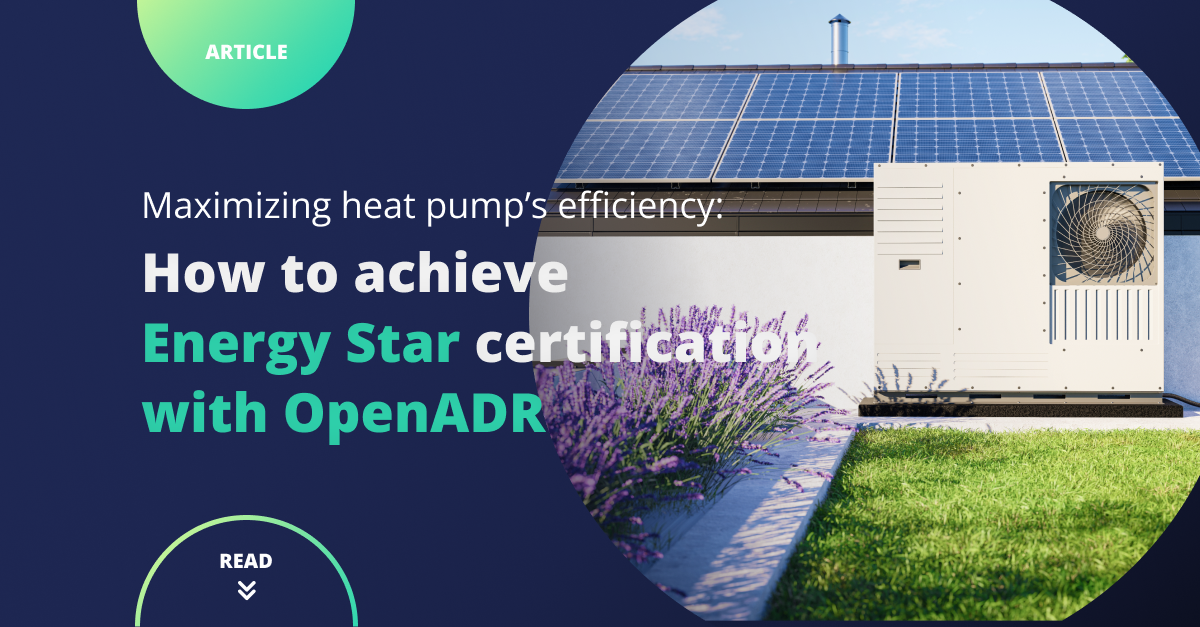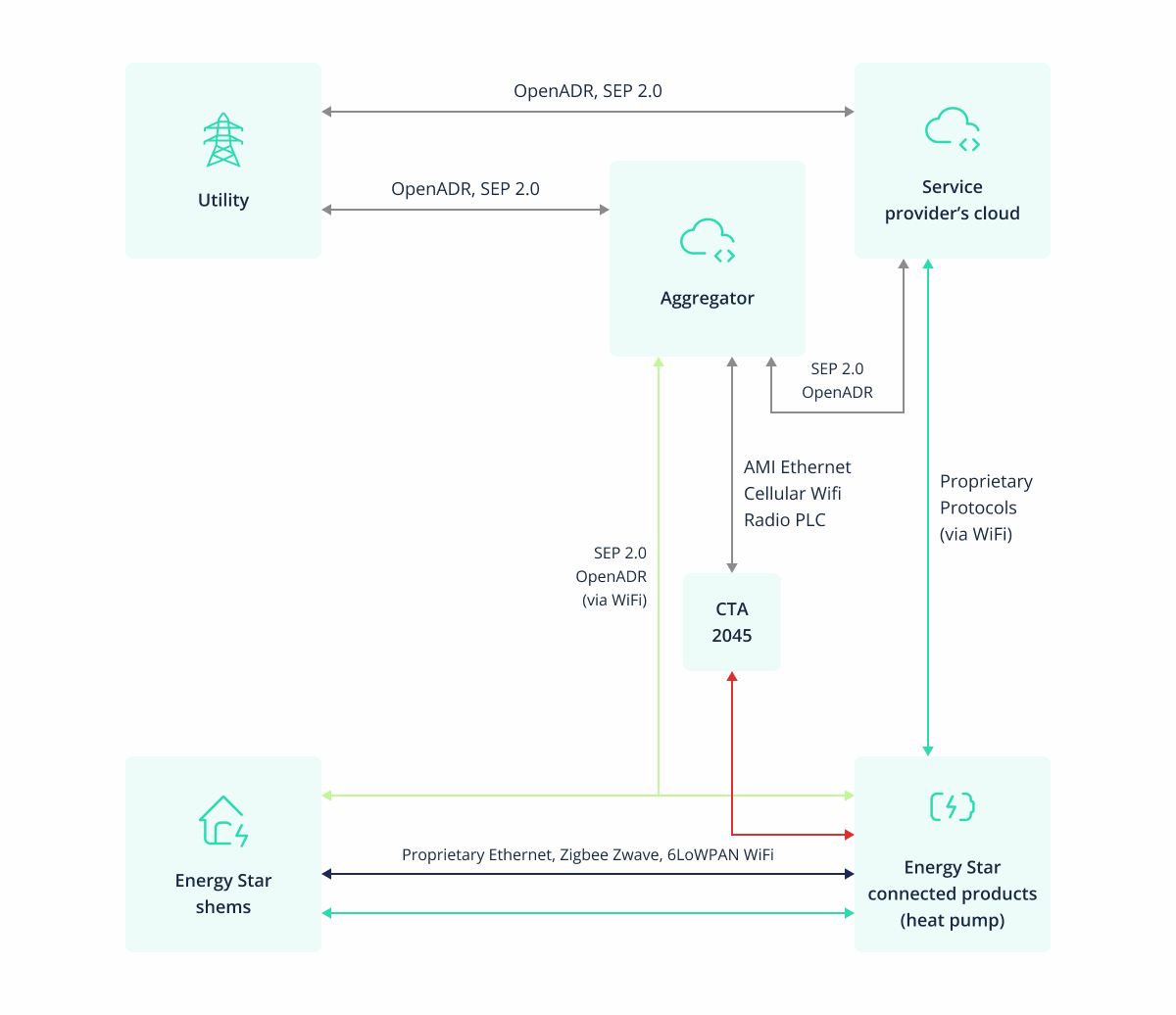Maximizing heat pump’s efficiency: How to achieve Energy Star certification with OpenADR

In the constantly evolving landscape of industrial efficiency, heat pump manufacturers are constantly seeking technologies that not only comply with stringent regulations but also drive market competitiveness. Open Automated Demand Response (OpenADR) emerges as a pivotal solution, enhancing heat pump functionality to meet Energy Star certification with unparalleled efficiency. This in-depth exploration will unpack how OpenADR not only meets contemporary standards but sets new benchmarks for environmental stewardship and operational efficiency in the B2B sector. Please note, for the purposes of this article, and the application to both OpenADR and Energy Star, a heat pump can be interpreted to mean either a water heater system or a heating, ventilation, and air conditioning unit (HVAC).
Why OpenADR matters in heat pump technology?
OpenADR represents a strategic advancement in energy management, providing a critical link between heat pump operation and dynamic energy markets. By automating the response to utility price signals and demand fluctuations, OpenADR ensures that heat pumps operate at optimal efficiency, precisely when it’s most economically and environmentally favorable.
- Strategic Advantage: The integration of OpenADR simplifies the Energy Star certification process by automatically aligning heat pump operations with the stringent performance benchmarks required for certification. This streamlined approach not only enhances compliance but also reduces the administrative and operational burden on manufacturers.
- Market Leadership: By adopting OpenADR, manufacturers can position their products at the cutting edge of technology. This is particularly appealing in a B2B context where businesses are looking to partner with innovators who provide scalable, future-proof solutions.
Operational advantages of OpenADR-enabled heat pumps: efficiency and reliability for business clients
The functionality of OpenADR extends beyond simple compliance, offering tangible operational benefits that are critical for businesses focused on sustainability and cost-efficiency.
- Intelligent Energy Management: By leveraging OpenADR, heat pumps can adjust their operation in real-time based on utility signals, thereby minimizing energy waste during off-peak times and maximizing efficiency during peak hours. This responsiveness not only reduces energy costs but also enhances the lifespan of the equipment by avoiding overuse.
- Performance Compliance: OpenADR’s precise control and monitoring capabilities ensure that heat pumps consistently meet or exceed the Energy Star certification and performance criteria. This reliability is crucial for businesses looking to maintain certification and enjoy the associated benefits without constant manual oversight.
Additionally, the implementation of OpenADR enables a more proactive approach to maintenance and service interventions, predicting potential issues before they become critical. This predictive maintenance capability can significantly reduce downtime and maintenance costs, further increasing the overall efficiency of operations. By integrating advanced analytics with OpenADR systems, businesses can gain deeper insights into usage patterns and operational efficiencies, enabling data-driven decisions that optimize performance and sustainability. Furthermore, OpenADR can support load balancing on the power grid, which not only benefits utility providers but also enhances the stability of power supplies for businesses during high-demand periods.
See the architecture options for grid communications:

OpenADR heat pumps: meeting regulatory, capturing eco-markets, understanding Energy Star certification
The implementation of OpenADR-equipped heat pumps positions manufacturers to proactively address both current and future market and regulatory demands.
- Regulatory Compliance: As governments worldwide intensify focus on energy efficiency, OpenADR provides a robust framework to ensure that heat pumps meet these evolving standards, safeguarding manufacturers against potential non-compliance penalties.
- Market Transition: In a market that increasingly values sustainability, OpenADR-enabled heat pumps stand out by offering advanced, eco-friendly technology. Heat pumps are transitioning to electric power supplies and will have lower emissions as a result of this transition. This alignment with global sustainability trends not only enhances corporate responsibility profiles but also attracts businesses looking to mitigate their environmental impact.
Additionally, OpenADR’s flexibility enables manufacturers to swiftly adapt to regulatory changes and market shifts, maintaining a competitive edge. This adaptability secures long-term partnerships with clients who value compliance with sustainability goals. Moreover, OpenADR’s influence on policy could lead to more favorable conditions for energy-efficient technologies. By using OpenADR as a differentiator in marketing strategies, companies enhance their appeal to eco-conscious stakeholders.
Cost efficiency and market differentiation of integrating OpenADR into heat pumps
Integrating OpenADR technology into heat pump systems presents significant economic benefits that extend well beyond energy savings, impacting broader financial outcomes and strategic market positioning. By automating the adjustment of energy consumption based on real-time utility signals and demand, OpenADR optimizes the operational efficiency of heat pumps. This optimization leads to reduced energy usage, particularly during peak demand times when electricity rates are highest. For instance, a medium-sized enterprise could lower its energy costs by 20-30% annually, which could translate into savings of thousands of dollars depending on local energy rates and usage patterns. These efficiency gains significantly diminish operational costs, providing businesses with a substantial competitive edge—either by enhancing pricing flexibility or by improving profit margins on each unit sold.
Moreover, the adoption of OpenADR-enabled systems is often supported by various government incentives, which further enhance the economic appeal of this technology. Many regions offer financial incentives such as tax rebates or reduced utility rates for the adoption of energy-efficient technologies. For example, companies could receive rebates that cover up to 10-15% of the costs associated with installing OpenADR-enabled heat pumps, which helps alleviate the initial investment.
Understanding costs vs. ROI
Integrating OpenADR technology also involves certain upfront costs. These can include expenses related to system upgrades, as well as software and potential hardware changes required to enable OpenADR capabilities. Despite these initial costs, the return on investment (ROI) can be significant over time. The operational efficiencies and energy savings achieved with OpenADR can drastically reduce long-term operational expenses. Additionally, businesses can generate potential revenue from participating in demand response programs, which provide compensation for reducing energy consumption during peak periods. The specifics of ROI will vary based on factors such as energy costs, usage patterns, and available incentives, but generally, the long-term financial benefits significantly outweigh the initial expenditures.
By capitalizing on these operational and economic benefits, businesses not only bolster their financial standing but also enhance their reputation as pioneers in sustainable technology—appealing to a growing segment of environmentally conscious consumers and stakeholders.

Implementing OpenADR: a strategic step to the business success and Energy Star certification
Effective integration of OpenADR with existing or new heat pump models requires strategic planning and detailed technical execution. Here are steps and points to be considered:
- Compatibility Check: The first step is to evaluate which models in your lineup are suitable for OpenADR integration. This typically involves assessing the current technological setup and determining the feasibility of incorporating OpenADR functionalities.
- Technical Upgrades: Necessary hardware and software upgrades must be implemented to ensure that heat pumps can communicate effectively with energy management systems via OpenADR. This might include adding or upgrading sensors and control units that can interpret and respond to OpenADR signals.
- Collaboration and Certification: Close collaboration with Open ADR and Energy Star certification bodies is essential to ensure that all technical modifications meet the strict standards required for certification. This process often involves rigorous testing and refinement to align product specifications with certification criteria.
- Education and Marketing: To maximize the market uptake of OpenADR-enabled heat pumps, manufacturers need to educate their B2B clients about the operational, environmental, and financial benefits of these upgraded systems. Effective marketing strategies should highlight case studies and ROI analyses to demonstrate the value of investment in OpenADR technology.
OpenADR as a way to achieve Energy Star certification
Embracing OpenADR technology in heat pump systems represents a proactive approach to meeting the dual challenges of energy efficiency and environmental sustainability. For manufacturers, this technology not only facilitates compliance with stringent Energy Star standards but also positions their products as the top choice for businesses aiming to future-proof their operations against an ever-tightening regulatory landscape.
Key to the value that links OpenADR to Energy Star is the ability for OpenADR to serve as an enabler to achieving ‘Connected’ status through the Energy Star certification program. While achievement of this status is not yet required, devices that comply with all connected criteria will be identified on the Energy Star website as having ‘Connected’ functionality, a key differentiator in the crowded market. This also means the device is able to directly or indirectly support signals-based Demand Response, as well as price response. The key communication protocols that qualify for ‘Connected’ status are OpenADR, CTA-2045, SEP 2.0, and OCPP, all of which allow for adequate communication with the grid operator. The EcoPort program through the OpenADR Alliance is a key enabler of this ‘Connected’ status capability and can be implemented in a streamlined manner to achieve business goals to be recognized as a market leader by the US government.
Is your business ready to step into the future of heat pump technology and Energy Star certification with OpenADR? Begin by evaluating your current systems, planning your integration strategy, and consulting with experts to ensure a smooth transition. Contact us to explore how OpenADR can transform your product offerings and help you achieve competitive advantage in the energy-efficient marketplace.
Please get in touch with one of our experts if you’d like to discuss demand response solutions!
contact us
Need expert guidance on your next energy project?
Reach out to us and discover how Codibly can offer tailored solutions to drive your business.